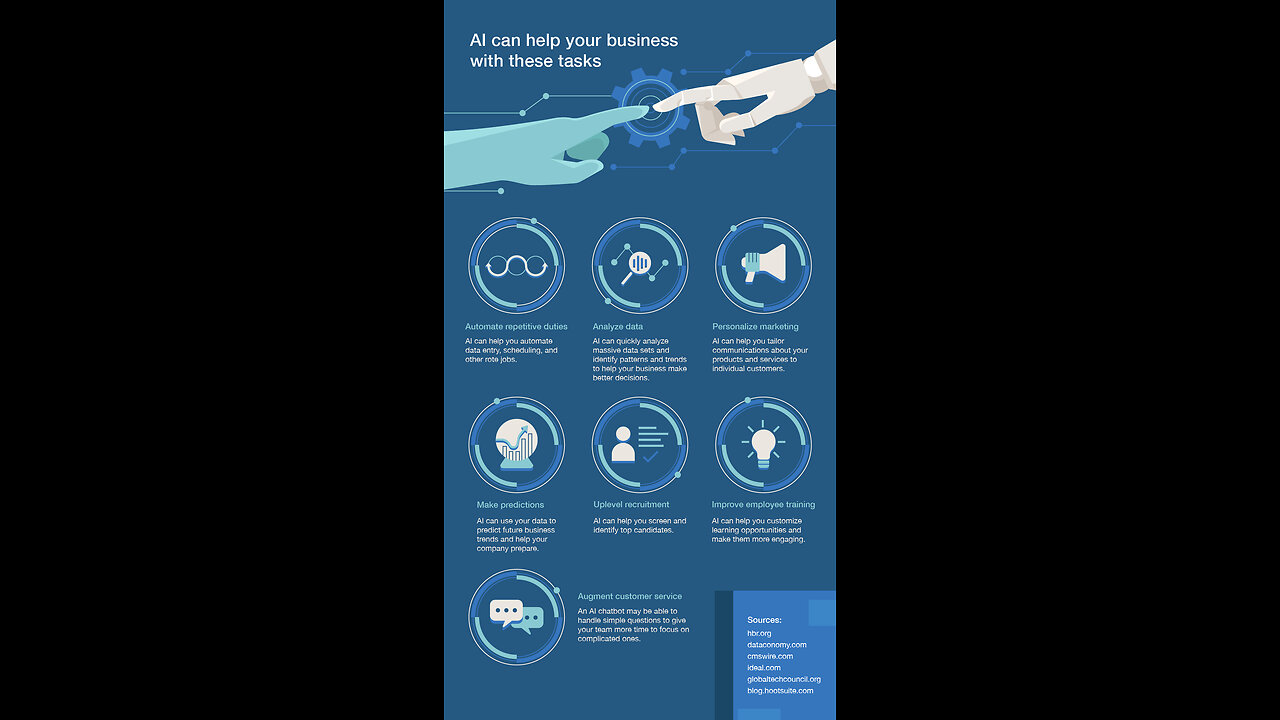Premium Only Content

How to Train Generative AI Using Your Company's Data - HBR.org Daily
🥇 Bonuses, Promotions, and the Best Online Casino Reviews you can trust: https://bit.ly/BigFunCasinoGame
How to Train Generative AI Using Your Company's Data - HBR.org Daily
Leveraging a company’s proprietary knowledge is critical to its ability to compete and innovate, especially in today’s volatile environment. Organizational innovation is fueled through effective and agile creation, management, application, recombination, and deployment of knowledge assets and know-how. However, knowledge within organizations is typically generated and captured across various sources and forms, including individual minds, processes, policies, reports, operational transactions, discussion boards, and online chats and meetings. As such, a company’s comprehensive knowledge is often unaccounted for and difficult to organize and deploy where needed in an effective or efficient way. Many companies are experimenting with ChatGPT and other large language or image models. They have generally found them to be astounding in terms of their ability to express complex ideas in articulate language. However, most users realize that these systems are primarily trained on internet-based information and can’t respond to prompts or questions regarding proprietary content or knowledge. Leveraging a company’s propriety knowledge is critical to its ability to compete and innovate, especially in today’s volatile environment. Organizational Innovation is fueled through effective and agile creation, management, application, recombination, and deployment of knowledge assets and know-how. However, knowledge within organizations is typically generated and captured across various sources and forms, including individual minds, processes, policies, reports, operational transactions, discussion boards, and online chats and meetings. As such, a company’s comprehensive knowledge is often unaccounted for and difficult to organize and deploy where needed in an effective or efficient way. Emerging technologies in the form of large language and image generative AI models offer new opportunities for knowledge management, thereby enhancing company performance, learning, and innovation capabilities. For example, in a study conducted in a Fortune 500 provider of business process software, a generative AI-based system for customer support led to increased productivity of customer support agents and improved retention, while leading to higher positive feedback on the part of customers. The system also expedited the learning and skill development of novice agents. Like that company, a growing number of organizations are attempting to leverage the language processing skills and general reasoning abilities of large language models (LLMs) to capture and provide broad internal (or customer) access to their own intellectual capital. They are using it for such purposes as informing their customer-facing employees on company policy and product/service recommendations, solving customer service problems, or capturing employees’ knowledge before they depart the organization. These objectives were also present during the heyday of the “knowledge management” movement in the 1990s and early 2000s, but most companies found the technology of the time inadequate for the task. Today, however, generative AI is rekindling the possibility of capturing and disseminating important knowledge throughout an organization and beyond its walls. As one manager using generative AI for this purpose put it, “I feel like a jetpack just came into my life.” Despite current advances, some of the same factors that made knowledge management difficult in the past are still present. The Technology for Generative AI-Based Knowledge Management The technology to incorporate an organization’s specific domain knowledge into an LLM is evolving rapidly. At the moment there are three primary approaches to incorporating proprietary content into a generative model. Training an LLM from Scratch One approach is to create and train one’s own domain-specific model from scratch. That’s not a common approach, since it requires a massive amount of high-quality data to train a large language model, and most companies simply don’t have it. It also requires access to considerable computing power and well-trained data science talent. One company that has employed this approach is Bloomberg, which recently announced that it had created BloombergGPT for finance-specific content and a natural-language interface with its data termina...
-
 52:40
52:40
Candace Show Podcast
2 hours agoSaturday Night Lively: What Were They Thinking? | Candace Ep 148
45.7K53 -
 2:02:21
2:02:21
Revenge of the Cis
3 hours agoEpisode 1449: Boo This
19.1K2 -
 1:20:31
1:20:31
Awaken With JP
4 hours agoWiping Hard Drives, Hire a Criminal Defense Lawyer - LIES Ep 79
54.4K33 -
 1:02:23
1:02:23
In The Litter Box w/ Jewels & Catturd
21 hours agoDEI Kills | In the Litter Box w/ Jewels & Catturd – Ep. 744 – 2/18/2025
65.3K36 -
 DVR
DVR
Game On!
3 hours agoBreaking Down COLLEGE BASKETBALL BETTING LINES Like a Pro!
4.17K2 -
 1:01:29
1:01:29
John Crump Live
5 hours agoMexico Backs Cartels By Threatening To Designate Gun Manufactures As Terrorist!
4.64K4 -
![[Ep 611] DOGE On The March! | Guest Sam Anthony - [your]NEWS | Seditious Dems | Ukraine](https://1a-1791.com/video/fwe1/97/s8/1/q/C/C/3/qCC3x.0kob-small-Ep-611-DOGE-On-The-March-Gu.jpg)
The Nunn Report - w/ Dan Nunn
3 hours ago[Ep 611] DOGE On The March! | Guest Sam Anthony - [your]NEWS | Seditious Dems | Ukraine
12.3K9 -
 1:00:56
1:00:56
The Tom Renz Show
9 hours agoThe War On DOGE Is ALSO A War On The Economy
18.8K6 -
 1:30:16
1:30:16
Steve-O's Wild Ride! Podcast
5 days ago $1.26 earnedAri Shaffir Exposes The Dark Side of Podcasting - Wild Ride #252
25.8K3 -
 1:56:29
1:56:29
The Quartering
6 hours agoAirplane FLIPS and CRASHES, Sean Duffy Slams Pete Buttigieg, & What Happened with Patriarchy Hannah
78K36